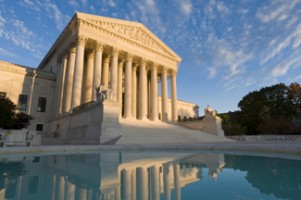SCOTUS justices who look to 'advocacy history' find reasons to undermine precedent

Image from Shutterstock.
Does the weight and meaning of a U.S. Supreme Court decision turn on the arguments presented beforehand? Chief Justice John G. Roberts Jr. appeared to suggest that the answer was yes during oral arguments on the constitutionality of a Mississippi abortion law that bans abortions after 15 weeks of pregnancy.
In the Dec. 1 arguments, Roberts suggested that Roe v. Wade could be upheld without its viability dividing line for abortions protected by the Constitution.
“Was viability an issue in the case?” he asked. “I know it wasn’t briefed or argued.”
The New York Times cited that example in a Sidebar column on the increasing role of “advocacy history” in debates over whether an opinion should be overturned.
“Whatever his goal,” the New York Times said of Roberts, “shifting the analysis from the words of the opinion to the advocacy that gave rise to it is a recent development and yet another way to undermine precedents.”
The column looked at a recent article by Richard Lazarus, a professor at Harvard Law School. In a preliminary draft available online, Lazarus argued that a full understanding of a Supreme Court decision requires a look at how the parties argued the case. But he said advocacy history is being used by justices who argue that a prior decision should be overruled or accorded less weight because incomplete or poor advocacy led to a poorly reasoned decision.
Stare decisis “is on the wane at the court,” Lazarus told the New York Times. “And advocacy history plays a role.”
The New York Times provided another example of the way that justices are relying on advocacy history.
In 2008, Justice Antonin Scalia discounted precedent on the meaning of the Second Amendment when he wrote the majority opinion in District of Columbia v. Heller, which found a constitutional right to own a gun as an individual, apart from service in a militia.
Scalia said the defendants “made no appearance in the case, neither filing a brief nor appearing at oral argument; the court heard from no one but the government (reason enough, one would think, not to make that case the beginning and the end of this court’s consideration of the Second Amendment),” citing a 1939 case, United States v. Miller.
Hat tip to How Appealing.



